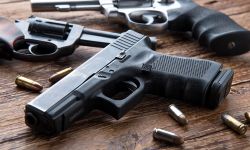Michigan bans open guns at Capitol, nearly a year after armed protest

LANSING — Commissioners who operate the Michigan Capitol voted unanimously Monday to ban openly carried firearms, capping a long-running debate more than 250 days after armed protestors loomed over lawmakers in the state Senate and three months after authorities exposed a plot to kidnap Gov. Gretchen Whitmer.
The Republican-controlled Capitol Commission unanimously approved an immediate ban during its 1 p.m. meeting Monday.
The six-member panel stopped short of a full gun ban, however, and will still allow concealed pistol license holders to carry their weapons into the building.The exception drew criticism from Democrats and gun rights groups who contend the new measure won’t deter violent extremists such as those who stormed the U.S. Capitol last week.
“It’s a good policy considering the times that we’re in and in terms of what is feasible and what we’re able to implement at this time,” Capitol Commissioner John Truscott, a Republican appointee, told Bridge Michigan on Monday.
“We don’t have the equipment, the personnel, budget — anything” to effectively ban concealed weapons, Truscott said, noting a more aggressive approach would require legislative funding to install metal detectors and beef up security forces. Both chambers of the Michigan Legislature are controlled by Republicans, who have been hesitant to enact stricter gun measures.
“So it would be an empty policy. We’re focusing on a policy that can actually be implemented.”
Related :
- ‘I’m going to have fun hunting,’ accused plotter said in Michigan Capitol
- Gun ban unlikely at Michigan Capitol, despite plot to storm it, take hostages
- Jocelyn Benson bans open carry of guns at Michigan polls on Election Day
- Ongoing updates: Plot to kidnap Whitmer | Who's charged, what's next?
The new policy comes amid reports that the FBI is warning that armed protests are planned in state Capitols nationwide from Saturday to Jan. 20, the date of President-elect Joseph Biden’s inauguration.
Michigan has been one of the few states nationwide to allow long guns in its Capitol. The little-known commission has been under pressure to make changes after protesters carrying long guns entered the Michigan Capitol on April 30 as the Republican-led Legislature considered whether to extend a state of emergency that had allowed Democratic Gov. Gretchen Whitmer to issue unilateral orders to combat the COVID-19 pandemic.
The armed protesters stood in the gallery of the Michigan Senate while lawmakers worked below on the floor of the chambers, where at least one lawmaker donned a bulletproof vest, a step some colleagues say they have taken since.
The demonstration was a “dress rehearsal” for last week’s rioting at the U.S. Capitol, state House Minority Leader Donna Lasinski and two Democratic colleagues wrote in a letter Sunday to the Capitol Commission.
“We call upon the commission to place an immediate ban on all firearms and other weapons,” said Reps. Lasinski, Sarah Anthony of Lansing and Brenda Carter of Pontiac. “In addition to lawmakers doing the work of the people, our Capitol is open to school kids, tour groups and others seeking to learn more about the history of our amazing state. Without a significant change in policy, lives will continue to be put at risk by domestic terrorists carrying weapons.“
But the commission determined an open carry ban was “the extreme limit of our real authority to actually implement something,” said Commissioner William Kandler, an appointee of Democratic Gov. Gretchen Whitmer. “We’re not security experts.”
Whitmer called the new policy “a good start” toward protecting the Michigan Capitol and its visitors but said more must be done to protect students, teachers, parents and others who visit the building for tours.
“We must take action to ban all weapons at the Capitol to keep Michiganders safe,” the governor said in a statement. “I am hopeful that the Capitol Commission will recognize the need for further action, and I stand ready to assist in implementing this policy to keep Michiganders safe.”
The commission’s about-face comes after the members debated for months on a ban, questioning whether they had the authority or resources to enforce such a policy.
Commissioners have said a ban on all guns would require cooperation from Michigan’s Republican-led Legislature, who they fear would be unwilling to appropriate funds for metal detectors and additional security that would be required to enforce a more aggressive policy.
Michigan Senate Majority Leader Mike Shirkey, R-Clarklake, supports a ban on open carry in the state Capitol but “believes those with permits should be allowed to concealed carry,” spokesperson Amber McCann told Bridge.
Speaker-elect Jason Wentworth, R-Farwell, said he is “grateful” for the Capitol Commission’s work but does not believe the panel has the authority to set gun policy in the building, according to a spokesperson.
“The speaker will be looking at options for handling that moving forward,” said Lynn Afendoulis. “In the meantime, the Michigan State Police will be enforcing the new ruling.”
Shirkey, an ardent Second Amendment supporter, has drawn criticism for meeting with protestors inside the Capitol during the April protest, while federal authorities allege some of the conspirators who plotted to kidnap Whitmer attended the event.
One armed protester, Wiliam Null, live-streamed the demonstration inside the Capitol and was recorded saying he would “have fun hunting” if shooting started during
In a Monday morning tweet, Nessel noted handguns have been used in past mass shootings, including the 2007 shooting at Virginia Tech, where an undergraduate student used two semi-automatic pistols to kill 32 and wound 17 others.
“Guns you can’t readily see are just as deadly as those you can,” Nessel, a Democrat, wrote. “The Capitol is not safe.”
Truscott, himself a concealed permit holder, noted that certification requires extra training.
“I am unaware of any CPL holder who has been convicted of any criminal shooting in Michigan,” he said. “I just don’t think it’s happened.
Advocates of stricter gun restrictions have noted that most government buildings, including Lansing City Hall, have tighter security than the Capitol.
Protest signs, however, have long been banned because officials say holders could accidentally bump and damage the historic building.
In a letter to the Capitol Commission, Sen. Erika Geiss, D-Taylor, said that only banning openly carried guns would not eliminate the risk for “mayhem and bloodshed.” She urged the commission to ban all weapons in the Michigan Capitol, work to install metal detectors at public entrances and take other steps to improve security and screening.
“I urge you to take a much bolder position on preserving the safety of the building and the people who spent time in its space,” Geiss wrote.
State Sen. Dayna Polehanki whose April 30 photo of armed men standing above lawmakers in the Senate gallery garnered national attention, expressed similar concerns.
“This is NOT a “step in the right direction”; in fact, it creates the *illusion* that people will be safe inside our Capitol,” the Livonia Democrat wrote in a tweet. “We are not safe until a total gun ban is enacted.”
Directly above me, men with rifles yelling at us. Some of my colleagues who own bullet proof vests are wearing them. I have never appreciated our Sergeants-at-Arms more than today. #mileg pic.twitter.com/voOZpPYWOs
— Senator Dayna Polehanki (@SenPolehanki) April 30, 2020
The commision meeting comes a week after a bomb threat temporarily closed the Capitol on Thursday morning.
On Friday, law enforcement announced three felony charges against a Charlotte, Michigan man, Michael Varrone, 48, whom police alleged made the threat. He is also accused of threatening the lives of Rep. Cynthia Johnson, D-Detroit, and her family members in December.
Johnson served on a House Oversight Committee that heard testimony from President Donald Trump’s personal attorney, Rudy Giuliani. Johnson shared posts on social media of death threats she received after she questioned the lawyer.
She’s one of many public officials who have received death threats in the wake of the Nov. 3 election, said Rep. Laurie Pohutsky, D-Livonia.
An open carry ban will not go far enough to protect politicians from potential violence, Pohutsky said.
“This threatening and intimidating rhetoric is not going anywhere,” she said. “We have to take it seriously, and part of that is making sure there are no weapons period in the Capitol or the office building.”
Commission member Kerry Chartkoff called the firearm issue “one of the most difficult ones to ever confront the Capitol Commision or its predecessor.”
She said she received hundreds of emails in support of the measure, while acknowledging that many wished the Commission would ban all weapons.
“We’ve gone as far as I think the commission can go with the issue at the present time,” said Commission Chair Gary Randall. “Certainly, it’s an issue that can be revisited.”
See what new members are saying about why they donated to Bridge Michigan:
- “In order for this information to be accurate and unbiased it must be underwritten by its readers, not by special interests.” - Larry S.
- “Not many other media sources report on the topics Bridge does.” - Susan B.
- “Your journalism is outstanding and rare these days.” - Mark S.
If you want to ensure the future of nonpartisan, nonprofit Michigan journalism, please become a member today. You, too, will be asked why you donated and maybe we'll feature your quote next time!




